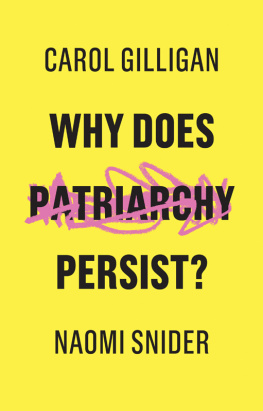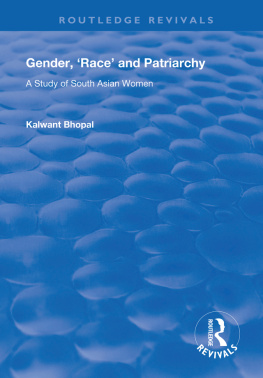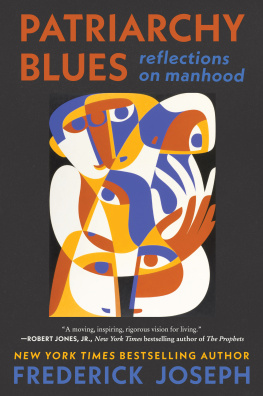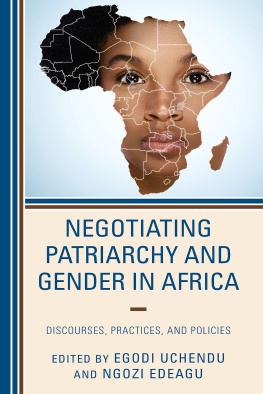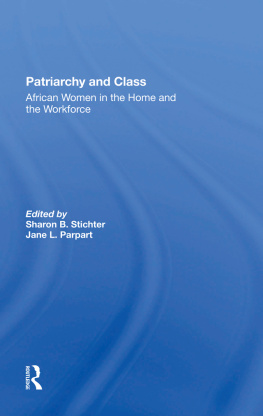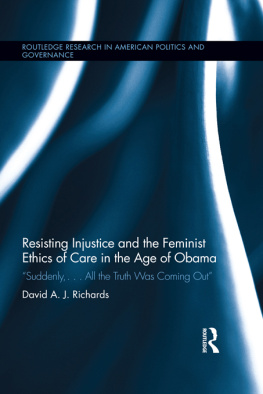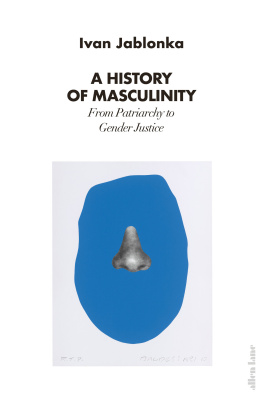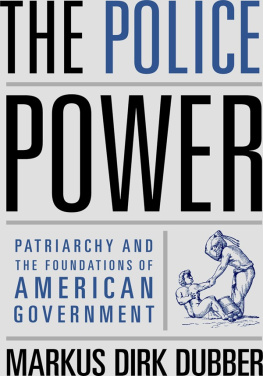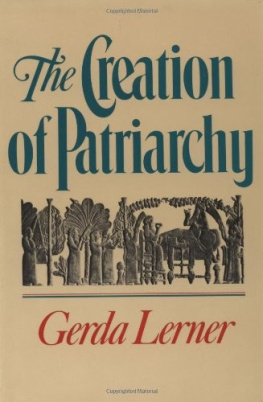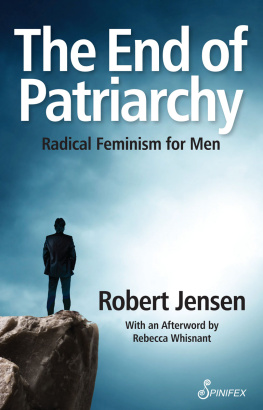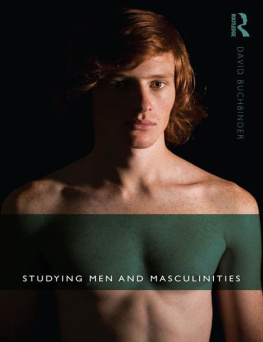
Copyright page
Copyright Carol Gilligan, Naomi Snider 2018
The right of Carol Gilligan, Naomi Snider to be identified as Author of this Work has been asserted in accordance with the UK Copyright, Designs and Patents Act 1988.
First published in 2018 by Polity Press
Polity Press
65 Bridge Street
Cambridge CB2 1UR, UK
Polity Press
101 Station Landing
Suite 300
Medford, MA 02155, USA
All rights reserved. Except for the quotation of short passages for the purpose of criticism and review, no part of this publication may be reproduced, stored in a retrieval system or transmitted, in any form or by any means, electronic, mechanical, photocopying, recording or otherwise, without the prior permission of the publisher.
ISBN-13: 978-1-5095-2912-4
ISBN-13: 978-1-5095-2913-1(pb)
A catalogue record for this book is available from the British Library.
Library of Congress Cataloging-in-Publication Data
Names: Gilligan, Carol, 1936- author. | Snider, Naomi, author.
Title: Why does patriarchy persist? / Carol Gilligan, Naomi Snider.
Description: Cambridge, UK ; Medford, MA, USA : Polity Press, [2018] | Includes bibliographical references and index.
Identifiers: LCCN 2018004124 (print) | LCCN 2018022965 (ebook) | ISBN 9781509529155 (Epub) | ISBN 9781509529124 | ISBN 9781509529131 (pbk.)
Subjects: LCSH: Patriarchy--Psychological aspects. | Social psychology.
Classification: LCC GN479.6 (ebook) | LCC GN479.6 .G56 2018 (print) | DDC 306--dc23
LC record available at https://lccn.loc.gov/2018004124
Typeset in 11 on 14 pt Sabon
by Fakenham Prepress Solution, Fakenham, Norfolk, NR21 8NN
Printed and bound in Great Britain by Clays Ltd, Popson Street, Bungay
The publisher has used its best endeavours to ensure that the URLs for external websites referred to in this book are correct and active at the time of going to press. However, the publisher has no responsibility for the websites and can make no guarantee that a site will remain live or that the content is or will remain appropriate.
Every effort has been made to trace all copyright holders, but if any have been inadvertently overlooked the publisher will be pleased to include any necessary credits in any subsequent reprint or edition.
For further information on Polity, visit our website: politybooks.com
Acknowledgments
This book had its inception in a seminar on resisting injustice, taught in the Fall of 2014 at the NYU School of Law. Its development was spurred by an invitation from the William Alanson White Institute to give a talk in their Fall colloquium series of 2016a talk which as it turned out took place on the night following Trumps election. Reading the published version of our talk, John Thompson invited us to turn it into a book. We owe an immense debt of gratitude to David Richards who co-taught the seminar on resisting injustice, to Nancy Nereo who chaired the colloquium series at White, and to John Thompson of Polity Press. In crucial ways, they encouraged and supported our collaboration.
We are profoundly grateful as well to the students whose voices inform and illuminate our discoveries. Our thanks to Adam and Jackie especially, and also to Christine and Katie for their contributions to this book. Thanks also to the members of NYUs Radical Listening ProjectJacqueline Cruz, Jessica Eddy, Noor Jones-Bay, and Tonya Leslie for their careful reading of earlier drafts of the manuscript. Their responses challenged us to think through more clearly many of the issues we raise. To Noor especially, our gratitude for her insights on the intersections of race and gender. To Ursula Diamond, Blythe Hawthorne-Loizeaux, and Dana Karin, our thanks for their responses to earlier phases of this work. Special thanks to Vice Provost Linda Mills. And to Beth Nash, special gratitude for her support of this project.
Our appreciation to Miri Abramis, Phillip Blumberg, Eugenio Duarte, Susan Fabrick, Sharon Kofman, Sue Kolod, Ruth Livingston, Gary Schlesinger, and Sarah Stemp of the White Institute for their contributions to this work. Our thanks to Tina Packer, Tova Hartman, Donna Kirshbaum, and Rachel Kadish, to Danielle Knafo, Beth Feldman, B. J. Cling, Judy Warren and Wendy Miller, and to Tracy Sidesinger, Tatyana Liskovich, and Schuyler Hunttheir responses to manuscript drafts were immensely helpful to us at various stages along the way. Special thanks to our readers for Polity Press for their wise suggestions.
Naomi wishes to thank Ruth Imber and James Phillips for listening, Elio Viglione for pushing her to places she had dared not go before, and Rachel Snider and Helen Snider for their constancy and love. She will always be grateful to her teachersCarol and David Richardsfor hearing and encouraging her protesting voice when it was just a whisper. Carol wishes to thank Dean Trevor Morrison for his support of this project in its early stages, and Peter Freedberger for his thoughtful assistance. She wants to thank John Thompson for his discerning eye and ongoing encouragement, and Jim Gilligan for being the ear she relies on.
Introduction
In the late fall of 2016, as Americans grappled with the election of Donald Trump as president, Adam, a third-year law student, turned inward. In his final paper for a seminar on resisting injustice, he puzzled over his betrayal of love. Ollie had been his best friend since they were six years old and played on the same soccer team. Adam recalls that over the years of their friendship they became brothers, trusting each other with their most intimate secrets. He remembers being nine years old and confiding in Ollie his desire to audition for the solo in his schools fourth grade concert. This was the first time that Adam had revealed to anyone outside of his immediate family that he liked to sing. For him, a self-proclaimed jock, the confession was a pretty big deal. Rather than mock me, Ollie roped me into spending the whole day rehearsing the solo in front of him while we built a stage frame out of broken down cardboard boxes.
Yet starting in tenth grade, Adam writes, I began to consciously distance myself from Ollie for the first time. Girls that I knew from his school had confirmed for me what I already suspected. Ollie was gay. In response, Adam began describing Ollie as just a friend from soccer, as if the friendship had been forced upon me by some great and unavoidable coincidence caused by sport and geographic location. Adam remembers telling his grandfather that he used to have a best friend, but no longer did. By senior year of high school the two boys had basically stopped communicating and since then have communicated exactly twice per year: sending a text on each others birthday.
Looking back, Adam is struck that his decision to stop calling Ollie his best friend in tenth grade was more prophetic than it was accurate at the time I said it. I had achieved exactly what I had set out to achieve. I had distanced myself from my best friend at a time when boys arent supposed to have best friends anymore, and certainly not best friends who might be breaking the love laws. And yet, Adam felt an overwhelming sense of sadness. It was not a bond Adam had wanted to break, and yet he had felt driven to do so:
It was as if something was telling me that I needed to separate my mind and my emotions, but I wasnt aware of what exactly it was, and I wasnt going to rock the boat to find out what would happen if I didnt. In fact, Im sure that I would have either rolled my eyes or laughed out loud if somebody had told me that the forces acting on me were forces pre-dating Aeschyluss 450 B.C.E. trilogy
Next page
